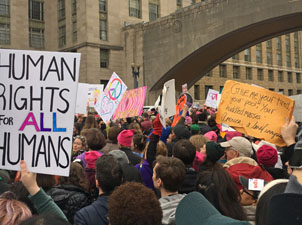
Anyone Can Lobby
Claudia Brock
November 18, 2017
In early November, NETWORK Lobby headed to the Ignatian Family Teach-In for Justice (IFTJ) for a few days of presenting, learning, and networking. As a graduate of a Jesuit university, it was heartening to see so many young people excited about social justice and willing to consider how their values influence politics. To begin the weekend, my colleague, Jeremiah, and I gave a “How to Lobby” presentation to prepare the students for their day advocating on Capitol Hill — the culmination of the IFTJ weekend.
One of my favorite parts of the presentation was when Jeremiah asked who had lobbied before and only a few students in a room of over one hundred people raised their hands. After a few moments, Jeremiah asked again and this time noted that signing on online petition, calling a Member of Congress or tweeting with a political hashtag were forms of lobbying; suddenly every hand in the room was up. At times it can feel like the political process is hard to navigate or so abstract it’s impossible to engage in it, especially as a young person who is not able to vote yet. But it is important to remember that every constituent has personal power in their own voice. It was enlivening to demystify what it means to be politically active through our presentation.
A few of us on the Grassroots Mobilization team at NETWORK had the chance to meet the renowned organizer Heather Booth. When she was asked what it took to be an organizer or make any kind of political change she said, “You just have to love people and hate injustice.” Using Heather Booth’s qualifications, every student at IFTJ and each member of NETWORK’s spirit-filled network has what it takes to enact real change.
As Jeremiah told the students at IFTJ, there are many ways to lobby for justice. If you’re busy working full time or have other responsibilities, it may be most convenient for you to lobby your elected officials by making phone calls. When you call, we recommend mentioning a brief personal reason for why you support or oppose a bill (see more tips here for using email, social media, or for an in-person lobby visit ). Find out how contacting your Member of Congress, using social media and writing letters to the editor are great ways to advocate for social change. Email [email protected] with any questions, comments, or to report back on how your lobbying goes!







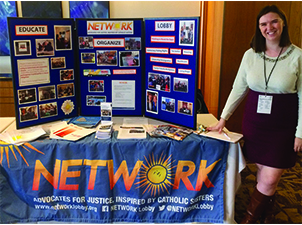
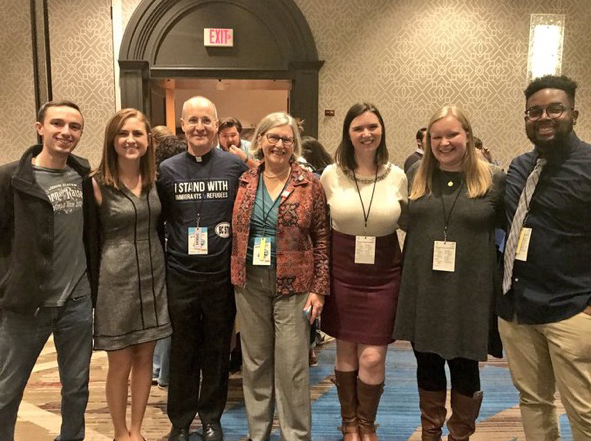


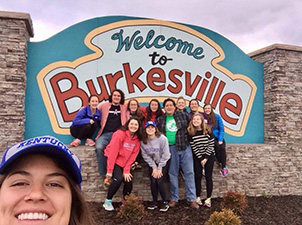
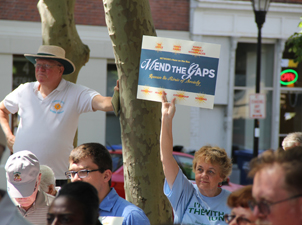
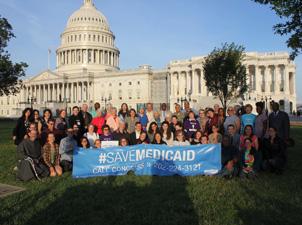

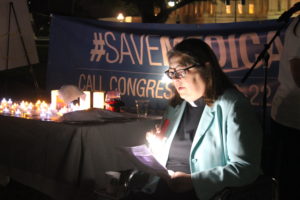 As a NETWORK intern, I’ve been so inspired by the work that faith organizations are doing to advocate for the dignity of all God’s children. These 23 hours were unlike anything I have seen before. I saw pain, passion, and promise. I witnessed vulnerability, I experienced agony and anger, and I felt the fear of what this new healthcare bill could mean for loved ones. For 23 hours, people of different faiths were all united in the mission to love our neighbor and to pray, sing, and speak out against the Senate and House versions of a new healthcare bill.
As a NETWORK intern, I’ve been so inspired by the work that faith organizations are doing to advocate for the dignity of all God’s children. These 23 hours were unlike anything I have seen before. I saw pain, passion, and promise. I witnessed vulnerability, I experienced agony and anger, and I felt the fear of what this new healthcare bill could mean for loved ones. For 23 hours, people of different faiths were all united in the mission to love our neighbor and to pray, sing, and speak out against the Senate and House versions of a new healthcare bill.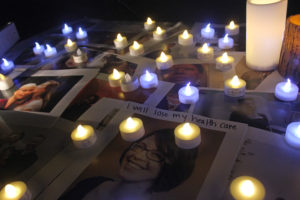 As Matthew 18:20 says, “For where two or three have gathered together in My name, I am there in their midst.” God’s presence was apparent on that Capitol lawn- in the people present, in the stories shared, in the songs chanted, in the prayers cried out, in the silence of the hearts. While we were surrounded by various powerful political institutions, the true power that night was on the patch of grass that held the hearts of those advocating for the human right of healthcare.
As Matthew 18:20 says, “For where two or three have gathered together in My name, I am there in their midst.” God’s presence was apparent on that Capitol lawn- in the people present, in the stories shared, in the songs chanted, in the prayers cried out, in the silence of the hearts. While we were surrounded by various powerful political institutions, the true power that night was on the patch of grass that held the hearts of those advocating for the human right of healthcare.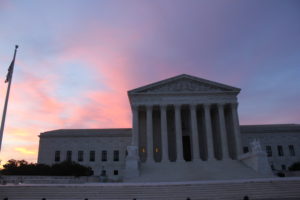 As people of faith, we all stand together, to advocate for our sisters and brothers. We have the power of God’s love and the power of our community, and that is far greater than any institutional power. Despite all the evident pain and fear, hope prevailed. Hope was there when the sun rose in the morning and cast a beautiful sunrise. I was reminded that we are the hope we need, we are the change we seek. That hope, that fire that burned inside all of us is as important now as ever.
As people of faith, we all stand together, to advocate for our sisters and brothers. We have the power of God’s love and the power of our community, and that is far greater than any institutional power. Despite all the evident pain and fear, hope prevailed. Hope was there when the sun rose in the morning and cast a beautiful sunrise. I was reminded that we are the hope we need, we are the change we seek. That hope, that fire that burned inside all of us is as important now as ever. This fight is far from over. For all of those who feel called, I urge you to keep sharing your stories. God doesn’t call us to be ineffective. God calls us to love our neighbors, to advocate for those who are unable to, to stand up for those who are hurting and suffering. God calls us to be a voice of truth, to speak out against this sinful healthcare bill that will take the lives of thousands of people and change the lives of millions of people forever. As Rev. J William Barber II exclaimed, “Jesus said, ‘When I was sick, you cared for me.’ He didn’t say, ‘When I was sick, you cared for some of me.’” As people of faith, we are called to be truth-seekers. We are called to share our stories. We are called to resist any policy that brings harm to our sisters and brothers.
This fight is far from over. For all of those who feel called, I urge you to keep sharing your stories. God doesn’t call us to be ineffective. God calls us to love our neighbors, to advocate for those who are unable to, to stand up for those who are hurting and suffering. God calls us to be a voice of truth, to speak out against this sinful healthcare bill that will take the lives of thousands of people and change the lives of millions of people forever. As Rev. J William Barber II exclaimed, “Jesus said, ‘When I was sick, you cared for me.’ He didn’t say, ‘When I was sick, you cared for some of me.’” As people of faith, we are called to be truth-seekers. We are called to share our stories. We are called to resist any policy that brings harm to our sisters and brothers.
